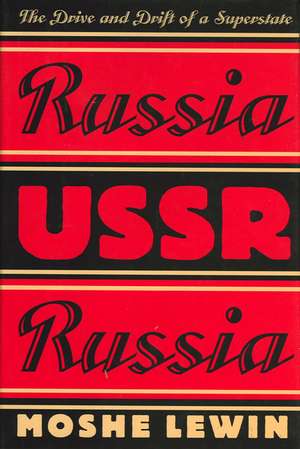Russia/USSR/Russia: The Drive and Drift of a Superstate
Autor Moshe Lewinen Limba Engleză Hardback – 31 ian 1995
Moshe Lewin’s major new book is an original and important work that clarifies the sweeping changes that transformed Russia in the twentieth century from a muzhik country to the urban power we read about today. As in his previous works, Moshe Lewin’s extraordinary breadth of knowledge and sympathy allows him to deal with the “grand narrative of cultural transformation” that goes well beyond simple studies of urban growth or industrialization.
The Soviet Union, as Lewin reminds us, was a rural country well into the post–World War II era, becoming predominantly urban only in the mid-1960s. The fascinating story that emerges from this book is one of a country that is becoming increasingly more complex even as it retains a “relatively primitive configuration of power.”
Professor Lewin goes on to show the historical roots of recent change. In the 1920s it was the government that was impatient to change, while society was transforming itself slowly. Recent years have seen a reversal of this situation, where a largely bureaucratic state simply lost its ability to govern a rapidly changing society. Professor Lewin’s analysis lays bare the underlying causes behind the present chaos in the former Soviet Union, where a government that barely understands the new forces that have been so dramatically unleashed finds itself totally unable to control them.
The Soviet Union, as Lewin reminds us, was a rural country well into the post–World War II era, becoming predominantly urban only in the mid-1960s. The fascinating story that emerges from this book is one of a country that is becoming increasingly more complex even as it retains a “relatively primitive configuration of power.”
Professor Lewin goes on to show the historical roots of recent change. In the 1920s it was the government that was impatient to change, while society was transforming itself slowly. Recent years have seen a reversal of this situation, where a largely bureaucratic state simply lost its ability to govern a rapidly changing society. Professor Lewin’s analysis lays bare the underlying causes behind the present chaos in the former Soviet Union, where a government that barely understands the new forces that have been so dramatically unleashed finds itself totally unable to control them.
Preț: 120.94 lei
Preț vechi: 151.87 lei
-20% Nou
Puncte Express: 181
Preț estimativ în valută:
23.15€ • 24.07$ • 19.37£
23.15€ • 24.07$ • 19.37£
Carte indisponibilă temporar
Doresc să fiu notificat când acest titlu va fi disponibil:
Se trimite...
Preluare comenzi: 021 569.72.76
Specificații
ISBN-13: 9781565841239
ISBN-10: 1565841239
Pagini: 384
Dimensiuni: 165 x 244 x 32 mm
Greutate: 0.67 kg
Ediția:New.
Editura: New Press
Colecția The New Press
Locul publicării:United States
ISBN-10: 1565841239
Pagini: 384
Dimensiuni: 165 x 244 x 32 mm
Greutate: 0.67 kg
Ediția:New.
Editura: New Press
Colecția The New Press
Locul publicării:United States
Notă biografică
Moshe Lewin was born in Poland and served in the Russian army during World War II. One of the most respected scholars in his field, he has been a Fellow in Russian Studies at Columbia, Princeton, and the Kennan Institute in Washington, D.C. He is the author of many books, including The Gorbachev Phenomenon and The Making of the Soviet System (reissued by The New Press). He is currently professor of history at the University of Pennsylvania.
Textul de pe ultima copertă
Moshe Lewin's major new book is an original and important work that clarifies the sweeping changes that transformed Russia in the twentieth century from a muzhik country to the urban power we read about today. As in his previous works, Professor Lewin's extraordinary breadth of knowledge and sympathy allow him to deal with the "grand narrative of cultural transformation" that goes well beyond simple studies of urban growth or industrialization. The Soviet Union, as Lewin reminds us, was a rural country well into the post-World War II era, becoming predominantly urban only in the mid-1960s. The fascinating story that emerges from this book is one of a country that is becoming increasingly more complex even as it retains a "relatively primative configuration of power". Professor Lewin goes on to show the historical roots of recent change. In the 1920s it was the government that was impatient to change, while society was transforming itself slowly. Recent years have seen a reversal of this situation, where a largely bureaucratic state simply lost its ability to govern a rapidly changing society. Professor Lewin's analysis lays bare the underlying causes behind the present chaos in the former Soviet Union, where a government that barely understands the new forces that have been so dramatically unleashed finds itself totally unable to control them.
